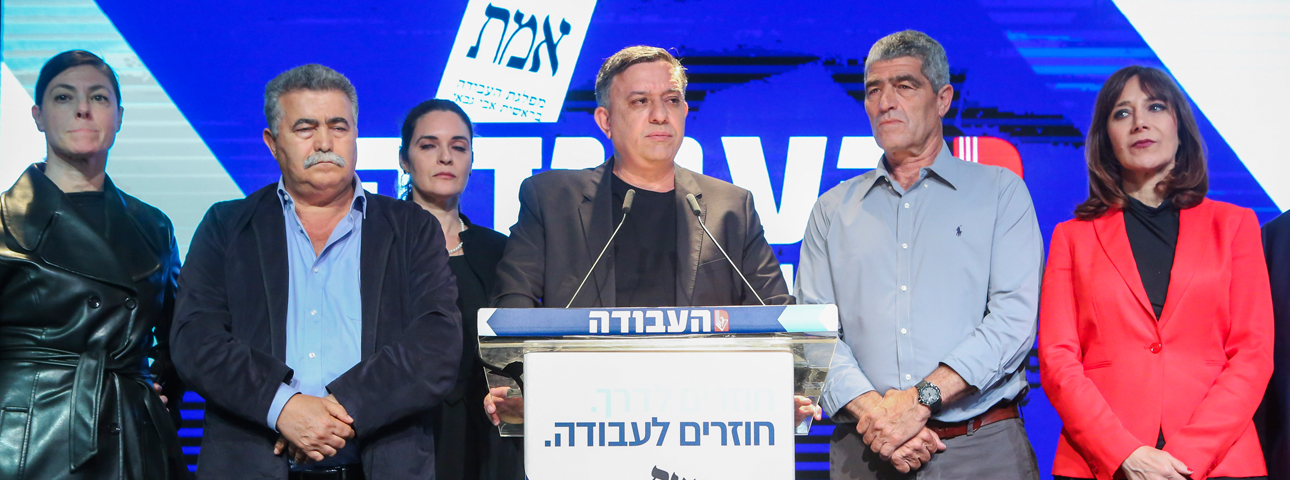The Liberal-Democratic Camp Will Keep on Losing Elections
Change will come only by engaging in an extended struggle over values, and by offering a true Jewish-democratic alternative in which both components are strong and complement one another

Flash 90
During the recent election campaign, the differentiation of left-wing versus right-wing did not concern the occupied territories. Rather, the focus was on an even more acute question: What kind of democracy exists in Israel, and what are its fundamental values? The clear victory by the right is an indication of the answer chosen by most Israeli citizens: Israel is a traditional Jewish state within a formal democracy framework. As usual, after the “surprise” of the election results, the center-left bloc is trying to understand why its campaign was unsuccessful, why the Arabs didn’t flock to the polls, and how could people have failed to vote “correctly”—all based on a whole-hearted belief, which somehow is renewed after ever election, that next time, everything will be different. Perhaps it will. But for things to change, the left must first understand that, numerically, public sentiment is now strongly aligned with the right, and that only by engaging in an extended struggle over values, and by offering a true Jewish-democratic alternative in which both components are strong and complement one another, can it shift votes to the center.
First of all, the numbers. The election results clearly show the gap in popularity between the blocs of the right and the center-left. The difference is even more dramatic when the overall number of votes for each, is taken into account, including those cast for parties that failed to reach the electoral threshold, and were therefore “wasted”. There are those on the left who claim that the only way to get the right out of power is to form a “democratic-civic” camp that will feature a partnership between Jews and Arabs. Even assuming for a moment that such a political partnership is a real possibility rather than a pipe dream, and that voter turnout among Arabs would be the same as among Jews, the right-wing bloc would still maintain its advantage. Given that the birth-rate is extremely high among ultra-Orthodox Jews (right-wing), high among national religious Jews (right-wing), it is clear that the gap will be even larger at the next elections.
This leaves the more substantial discussion of what, in fact, the elections were really about. In recent years, a new rift has formed between the right and the center-left: the democratic divide. This concerns the question of what kind of Jewish and democratic state Israel ought to be. Is the State’s identity, one in which Jewishness is nationalist, particularist, and essentially Orthodox, and in which democracy is no more than a formal decision-making mechanism? Or a state with inclusivist forms of Jewishness and nationalism, in which democracy also extends to include a set of liberal values based on equality, individual freedoms, the absence of coercion, and an unrestricted ability to choose one’s own way of life? Or in other words: does democracy give the majority the right to rule almost unrestrained, or does it mean that majority rule is constrained by the rule of law and is open to criticism?
This debate about the nature of Israeli democracy predates these elections, but this was the first time it took center stage in the campaign. It could be argued that the legal position of the prime minister, and his attacks on law enforcement agencies and figures, were one of the factors behind this, but that would in fact be something of a smokescreen. The argument between left and right over the character of the State of Israel is a much deeper struggle over values. On the left, the peace camp seeks to continue Israel’s democratic tradition that sees the country’s Jewish-national component as one that is well aligned with humanist values, and that views the democratic component as an expression of strongly liberal values. On the right, an even larger camp, which is mainly traditional and religious, believes that the democratic component should be restricted to a formal mechanism of decision making, and sees Judaism as the source of conservative and particularist values that stand in opposition to the liberal approach.
What has led to this change? Recent years have seen Israel become more traditional. In fact, most Israeli Jews now define themselves as being religious or traditional, and only a minority (43%) consider themselves to be secular. Moreover, in-depth studies show that many of these self-declared secular Israelis are in fact traditional in their practices and beliefs.
Accordingly, we now face a key question that certainly has consequences for the Jewish character of the State of Israel, but also affects its democratic character: What do most Jews in Israel consider Judaism to be? Is it an Orthodox, conservative, and exclusivist form of Judaism, or a more open and accepting form that makes room for others as well, including the non-religious and non-Jews? The first kind of Judaism seeks to restrict the democratic component of the state to a minimum, while the second kind complements the democratic component and seeks to expand it.
Thus, the struggle over what kind of “Jewish” we want our country to be is critical not just for the future of Judaism in Israel, but also for the future of Israel as a Jewish and democratic state. If the center-left bloc wants to gain power, it needs to persuade Israelis that Judaism in Israel should be of the kind that also allows it to be substantively—and not just formally—democratic.
The article was published in Times of Israel.
